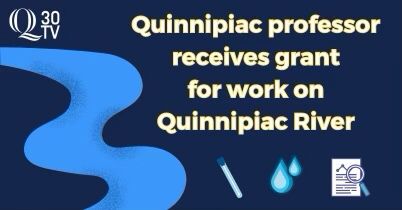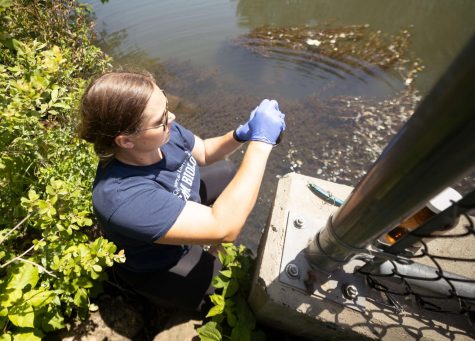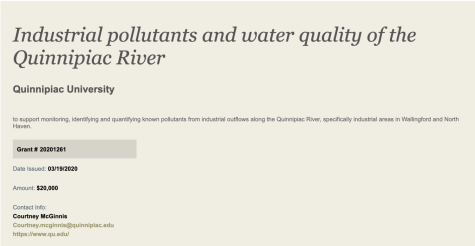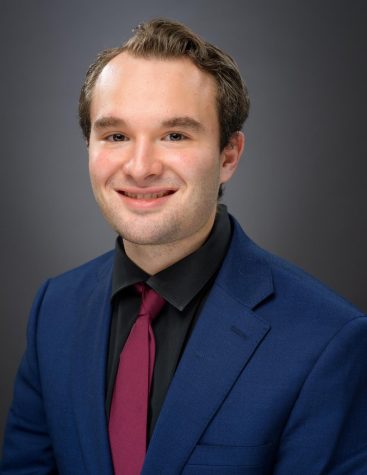Quinnipiac professor receives grant for work on Quinnipiac River

August 14, 2021
Biological sciences professor Courtney McGinnis received a $13,000 grant through The Quinnipiac River Fund to collect water samples for her research project on the Quinnipiac River.

The grant, awarded through The Community Foundation for Greater New Haven, calls for collecting and testing water samples from locations in Wallingford, Hamden and North Haven to identify the presence of pesticides, phthalates and plasticizers.
“I am thrilled that we were able to have The Community Foundation for Greater New Haven continually support our research, especially this year,” McGinnis said. “With the pandemic going on, we were not sure what was going to happen or how much money we were going to be awarded.”
The purpose of the Quinnipiac River Fund is to help improve the quality of the Quinnipiac River through the research, conservation and advocacy for the river and surrounding areas.
Since 2015, the project has received grants from The Community Foundation for Greater New Haven, with the awards ranging from $13,000 to $27,000.
Founded seven years ago by former Quinnipiac chemistry professor Harry Pylypiw, McGinnis explained how his decision to put a biological perspective on the project would forever make an impact on her career.
“He was looking for someone to pass the project to and asked me if I would be interested in building in a biological context to it,” McGinnis said. “To be honest, thinking where I am now and what I said yes to back then, I didn’t know what I was getting into and I hadn’t done field work in a long time.”
Last year, the Quinnipiac River Fund received its largest grant towards the project, but due to the pandemic, some of the allocated money had to be put on
“In 2020, the grant that we had received… was to bring in two faculty members from the School of Engineering to improve what we have been seeing and detecting in the river,” McGinnis said. “But because of COVID, we weren’t able to manage that scope of the project and much of that grant funding was rolled over into this year’s funding.”

In addition to identifying common pollutants within the Quinnipiac River, the grant also funds two research students to aid. Students associated with the project play a part in all facets of the project – from collecting and preparing samples for observation to analyzing samples through gas chromatography-mass spectrophotometry (GC-MS) and presenting findings.
Throughout the past seven years, McGinnis has worked with 10 different students on this project, with this year’s research students including 3+1 biology masters student Sophia Davis and senior civil engineering major Stephen Porobija, who is the first student outside of the College of Arts and Sciences to be working on the project.

Porobija- who was introduced to the Quinnipiac River project through assistant teaching professor Professor Kimberly DiGiovanni- shared what it was like to be a student from an outside major to participate in these kinds of environmental projects.
“It’s really cool to take part in this project,” Porobija said. “I encourage other engineers to go for it too, especially if you’re debating in doing environmental engineering. It gives you an aspect of what it could be like in the field. Plus you get to help monitor the river and protect the environment, which is a good cause that I was all for.”
For Davis, she values being able to take what she learns and apply it to both her schoolwork and opportunities after she graduates.
“This experience was one I learned a lot from,” Davis said. “I learned a lot of research techniques including using the new GC-MS instrument we have in the chemistry lab,” Davis said. “I also learned that environmental science may be something I am interested in as a future field. The research experience I was able to gain is something I will take with me as I look for career opportunities next year.”
McGinnis says one of the most rewarding experiences of this project is getting to know her research students while working out in the field, as she gets time to work with Davis and Porobija one-on-one and learn what it means to be a good mentor.
For Porobija, it’s being able to go out in the field and get the hands-on training that makes the experience worth it.
“Being out in the field, it lets you know that it’s more of a hands-on experience and makes you feel like you’re contributing to an important project,” Porobija said. “When you go out and gather the information, investigate the analysis of the tests for how many platelets are in the river, then maybe we can take action forward on it.”






